“The Right Tools, the Right Campaigns! Your Marketing Revolution Starts Here.”
Introduction
Let’s face it – in the chaotic, always-on world of digital marketing, having a knack for strategy just won’t cut it anymore. If you want to make your campaigns not just good, but legendary, you need to arm yourself with the best marketing tools. Think of them as the secret weapons that separate the amateurs from the pros. From small businesses to giant corporations, marketing tools are the rocket fuel that powers campaign performance, supercharges efficiency, and boosts ROI.
The truth is, without the right set of tools, you’re trying to navigate a high-speed race on a tricycle. But with the top marketing software in your arsenal, you can skyrocket your productivity, streamline your processes, and keep your audience coming back for more. In this blog, we’re diving into the most powerful marketing management tools of 2025 that will help you cut through the noise and get results.
Ready to revolutionize your campaigns? Let’s take a closer look at why marketing automation and the best campaign management tools are the game-changers you need to elevate your strategy and performance. Get ready to stop working harder and start working smarter.
Why Marketing Management Tools Matter
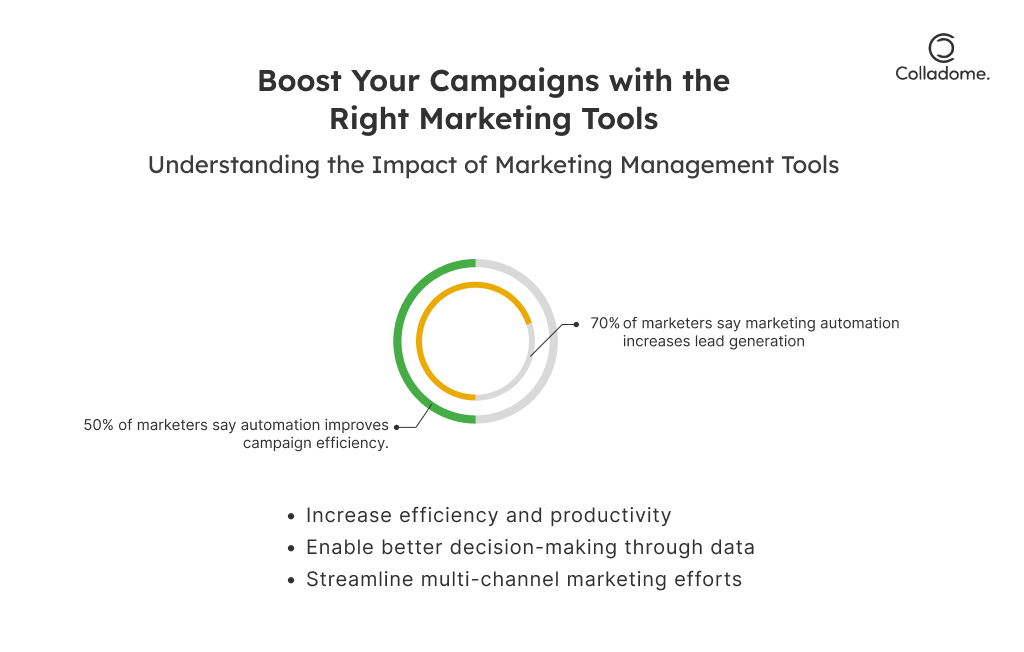
-
Efficiency Beyond Imagination
- Automate repetitive tasks like email distribution, social media scheduling, and data analysis.
- Reduce human errors, ensuring smoother, more effective campaigns.
- Free up time for your team to focus on creative strategy and high-level decisions.
-
Data-Driven Campaigns
- Access real-time analytics to identify trends, customer behavior, and key performance indicators (KPIs).
- Make smarter, data-backed decisions that optimize campaign performance.
- Stay ahead of the competition by continuously adjusting strategies based on real-time data.
-
Seamless Collaboration
- Enable real-time teamwork, regardless of location or time zone.
- Streamline communication and coordination across teams for quicker campaign execution.
- Enhance efficiency by centralizing project management and tracking within one platform.
What Are Marketing Management Tools?
In today’s fast-paced digital world, marketing management tools are the ultimate game-changers. These are software or platforms designed to streamline, automate, and elevate every aspect of marketing—from attracting leads to tracking your ROI. Whether you’re running a small business or managing a global campaign, these tools are your ticket to creating impactful, results-driven marketing strategies.
Here’s why you need them:
Key Features of Marketing Tools
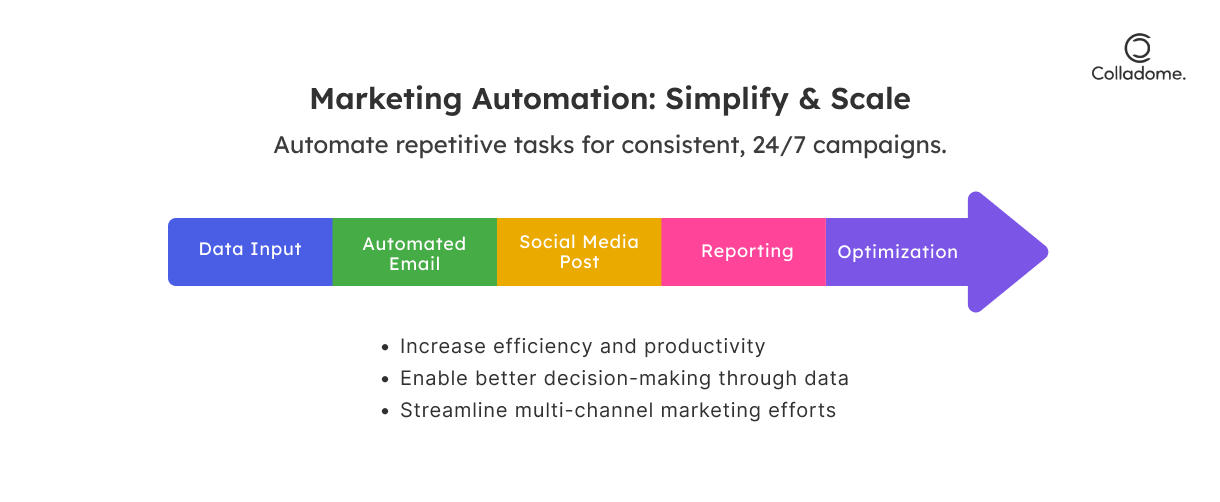
1. Marketing Automation: The Power of Set-It-and-Forget-It
-
- Forget the manual grind. Automate everything from email campaigns and SMS blasts to retargeting ads.
- Engage customers at the right time with the right message, all while you sleep.
- Campaigns run on autopilot, freeing up your team for more creative, high-value tasks.
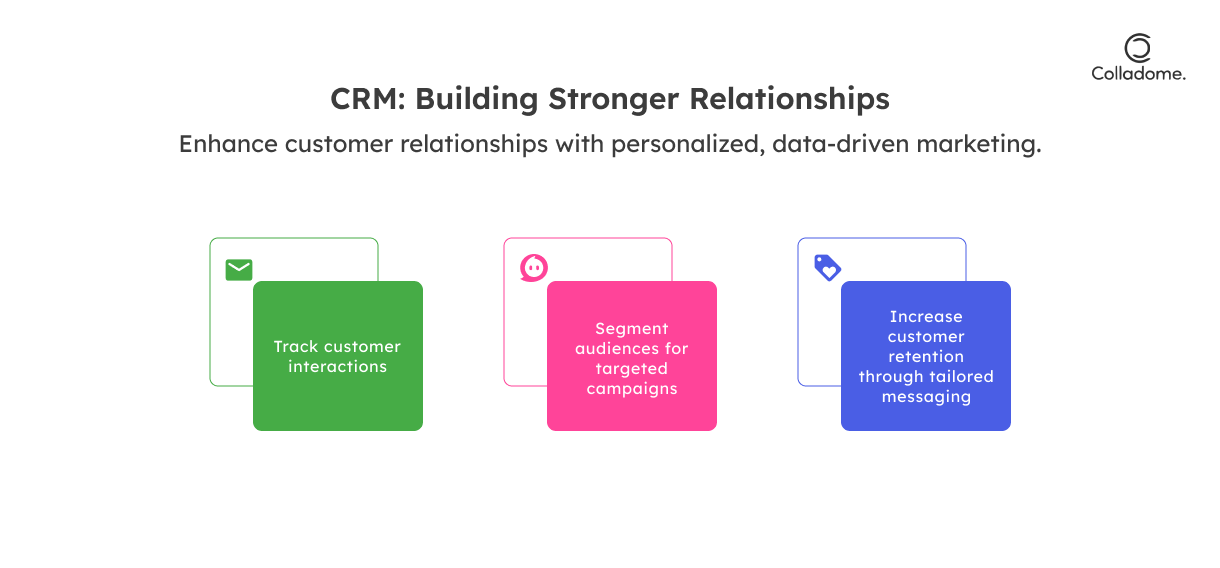
2. Customer Relationship Management (CRM): Your Customer’s Best Friend
-
- A CRM isn’t just a database—it’s your lifeline to understanding your audience.
- Track every interaction, from initial inquiry to post-purchase support, to tailor personalized marketing efforts.
- Improve retention rates by building deeper, more meaningful relationships with your customers.
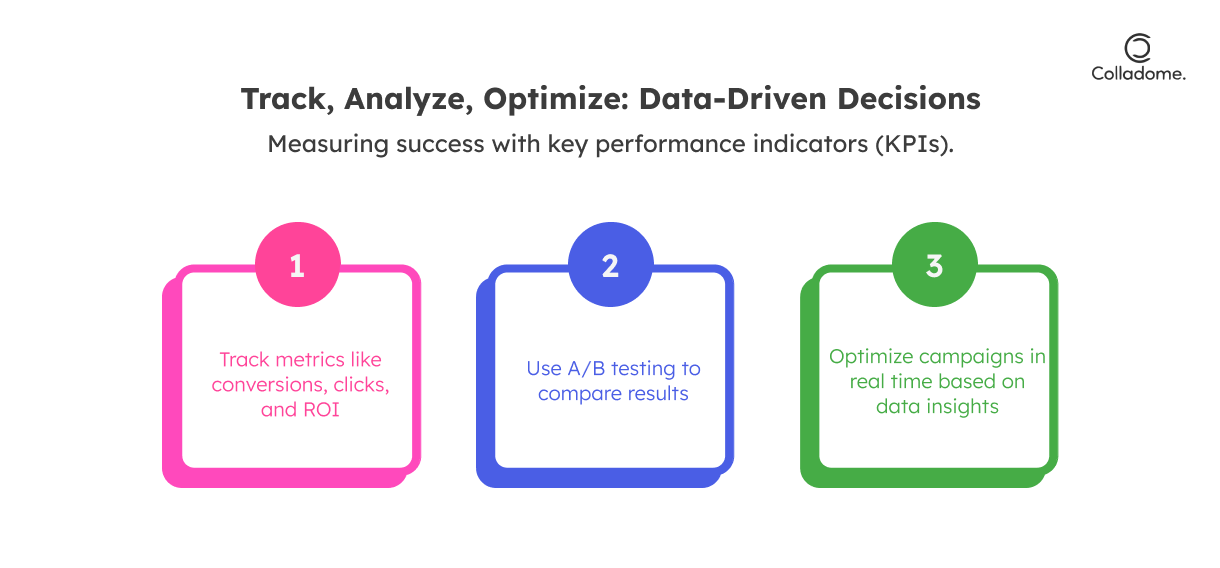
3. Campaign Tracking: Measure What Matters
-
- Metrics like clicks, conversions, and ROI aren’t just numbers; they’re the story of your campaign’s success.
- Gain clear insights into what’s working and what needs tweaking—live, in real time.
- Make data-driven decisions to optimize campaigns and boost performance, not guesswork.
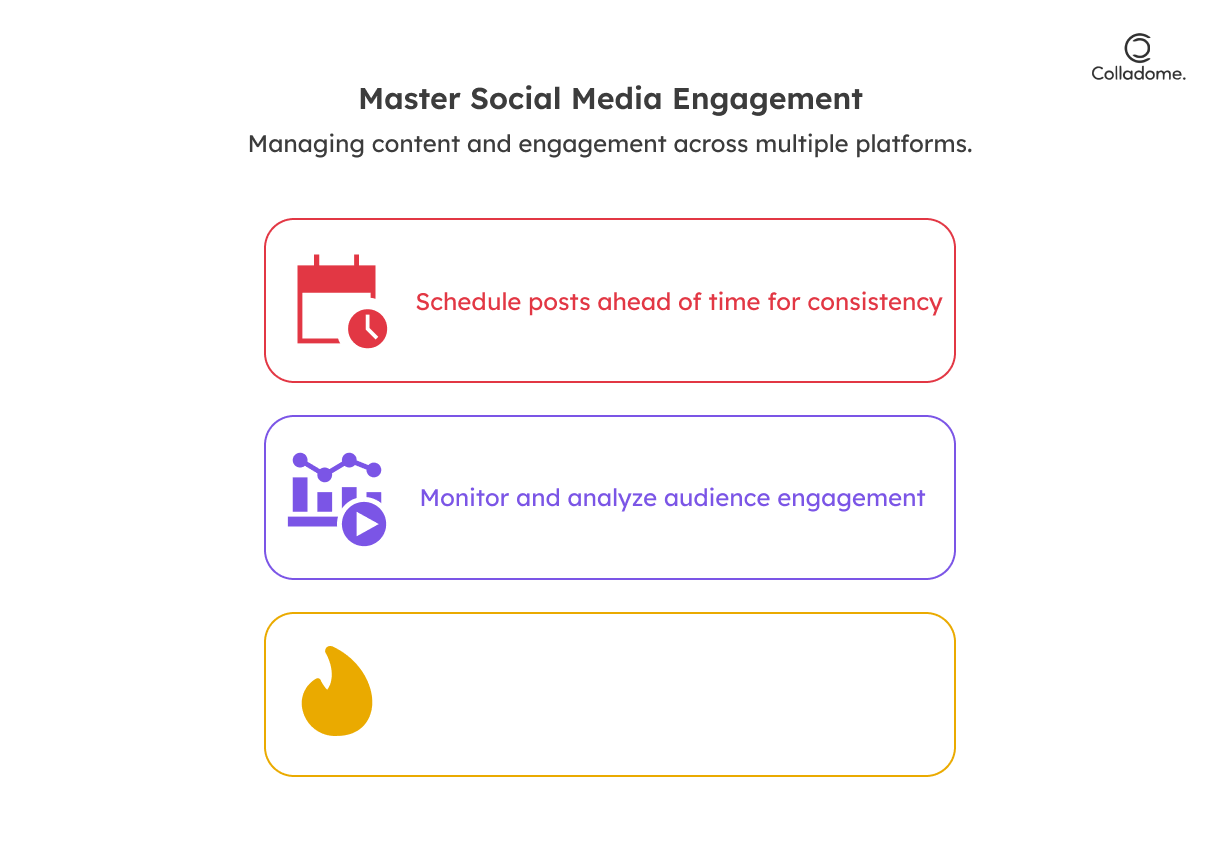
4. Social Media Management: Your Command Center for Engagement
-
- Manage all your social media accounts in one place—schedule posts, track engagement, and analyze trends.
- Focus your energy on creating buzz-worthy content, while your tools handle the timing and analytics.
- Monitor customer sentiment and jump into conversations at the right moment to drive brand loyalty.
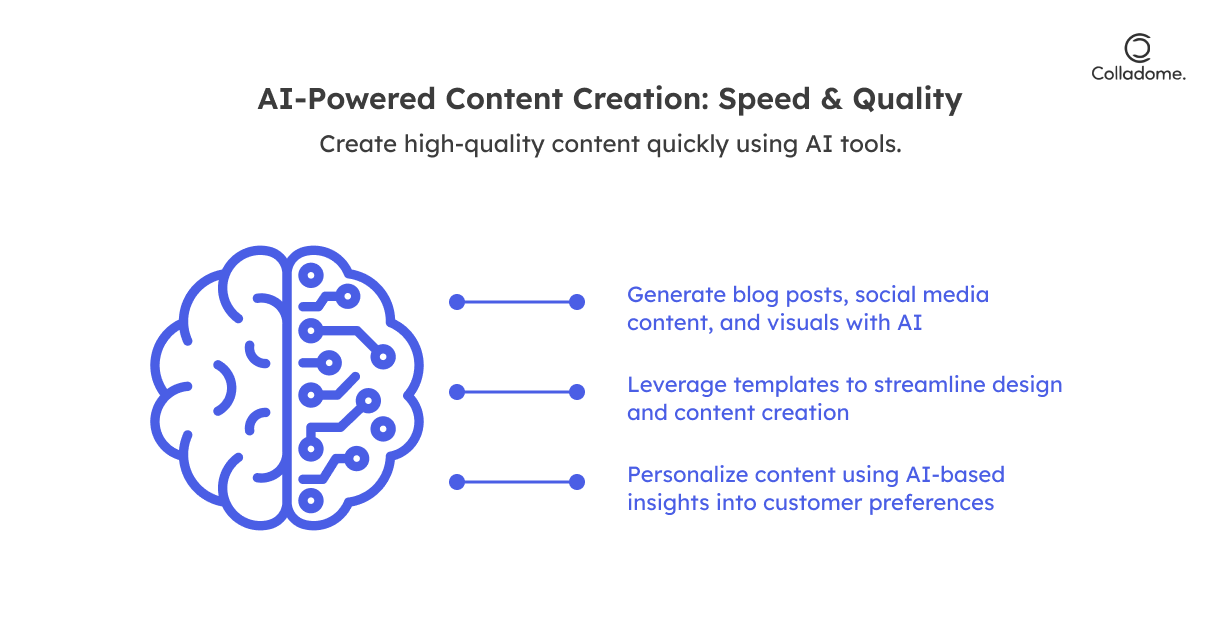
5. Content Creation: Let AI Do the Heavy Lifting
-
- Use AI tools and templates to craft stunning visuals and persuasive copy that grabs attention.
- No more design headaches—produce professional-grade content in minutes.
- Scale your content production while maintaining quality and creativity, without needing a full design team.
| Tool | Magic It Works | Why You Need It |
| Marketing Automation | Automates emails, SMS, ads, and more | Run 24/7 campaigns without breaking a sweat! |
| CRM | Tracks customer moves & personalizes the vibe | Turn leads into loyal fans with killer relationships! |
| Campaign Tracking | Monitors clicks, conversions, and ROI | Make data-driven moves for max impact! |
| Social Media Management | Schedules posts, tracks trends | All your socials, one dashboard, zero hassle! |
| Content Creation | AI-powered templates for visuals & copy | Quick, quality content with zero creative block! |
How to Leverage Marketing Tools for Campaign Success
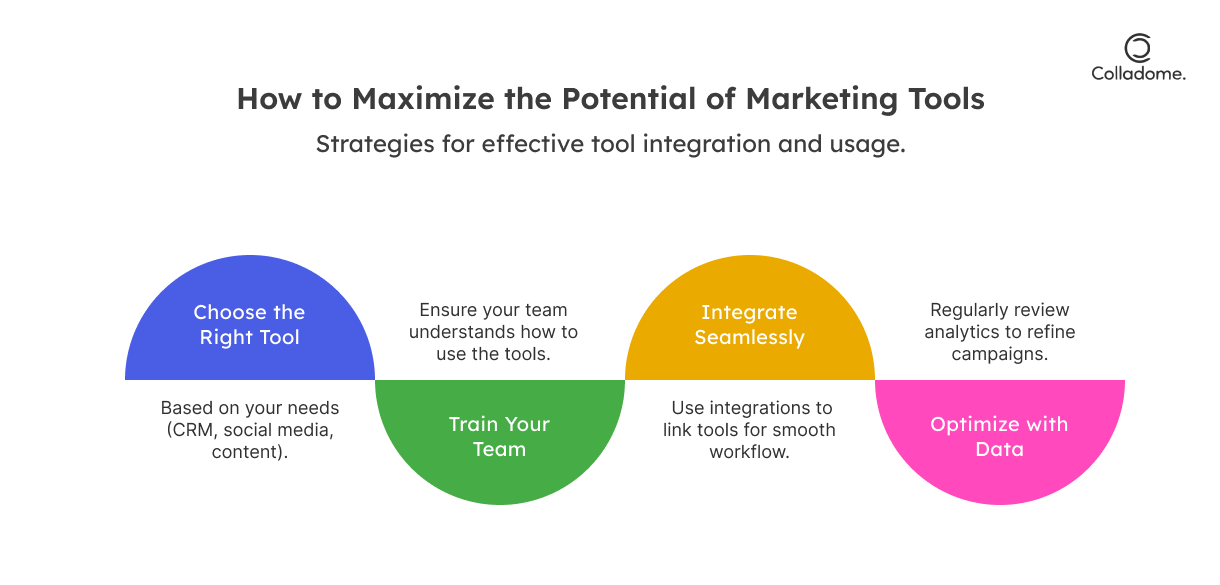
-
Choose the Right Tool (Don’t Just Pick Pretty Colors!)
- Identify your needs: Is it social media dominance, email marketing wizardry, killer analytics, or all-in-one CRM magic? Know what problem you need to solve before jumping in.
- Scalability is Key: Pick tools that grow with you. If you’re planning to go big, you need tools that don’t just handle today’s needs but tomorrow’s too!
-
Train Your Team (Tools Won’t Work Without the Right Hands!)
- Hands-on workshops: Get your team familiar with the tool, but also with the mindset. A tool is only as good as the person using it. Make it fun and engaging — gamify it!
- Encourage feedback: Tools are useless if they’re not used effectively. Have regular check-ins and encourage your team to speak up when something’s not working. Adapt and evolve!
-
Integrate Tools Seamlessly (Don’t Let Them Work in Silos!)
- Compatibility is king: Ensure your shiny new marketing tool plays well with your existing systems. If it’s a struggle, it’s not worth it.
- Zapier to the rescue: Why juggle multiple platforms when you can connect them? Automate workflows between your tools and make your life easier.
-
Optimize Campaigns Through Analytics (Make Data Your BFF!)
- Analyze, optimize, repeat: Look at those juicy metrics — clicks, conversions, engagement. Use those insights to fine-tune your campaigns.
- A/B testing is your best friend: Don’t just guess — test. Try different strategies, creatives, and CTAs to see what works. The more you test, the more you improve.
Top Marketing Management Tools to Boost Your Campaigns in 2025
Here’s a curated list of top-rated tools for different aspects of campaign management:
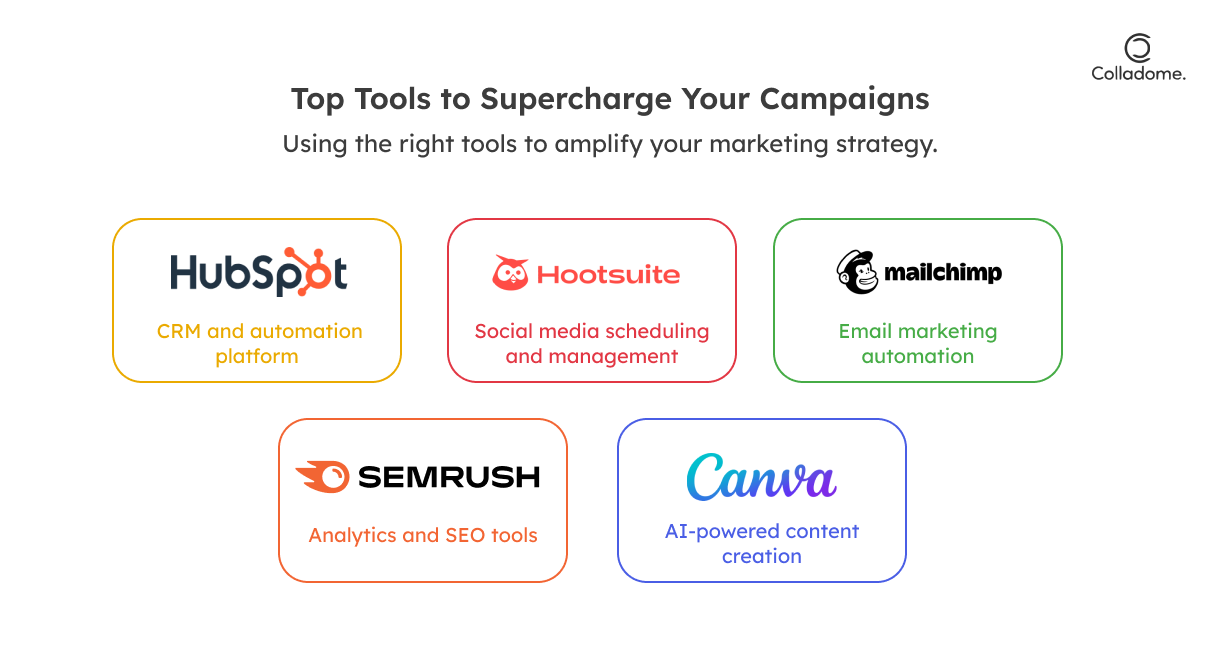
| Tool | Purpose | Best For |
| HubSpot | CRM, email marketing, analytics | Comprehensive inbound marketing powerhouse |
| Hootsuite | Social media management | Scheduling & tracking across multiple platforms |
| Mailchimp | Email marketing | SMBs who need automation and insights |
| SEMrush | SEO & content marketing | Dominating keyword research & competitor analysis |
| Marketo | Marketing automation | Enterprise-level lead gen & nurturing |
| Canva | Content creation | Crafting stunning visuals in minutes |
| Trello | Collaboration & project management | Keeping your marketing team on track & in sync |
Real-Time Examples
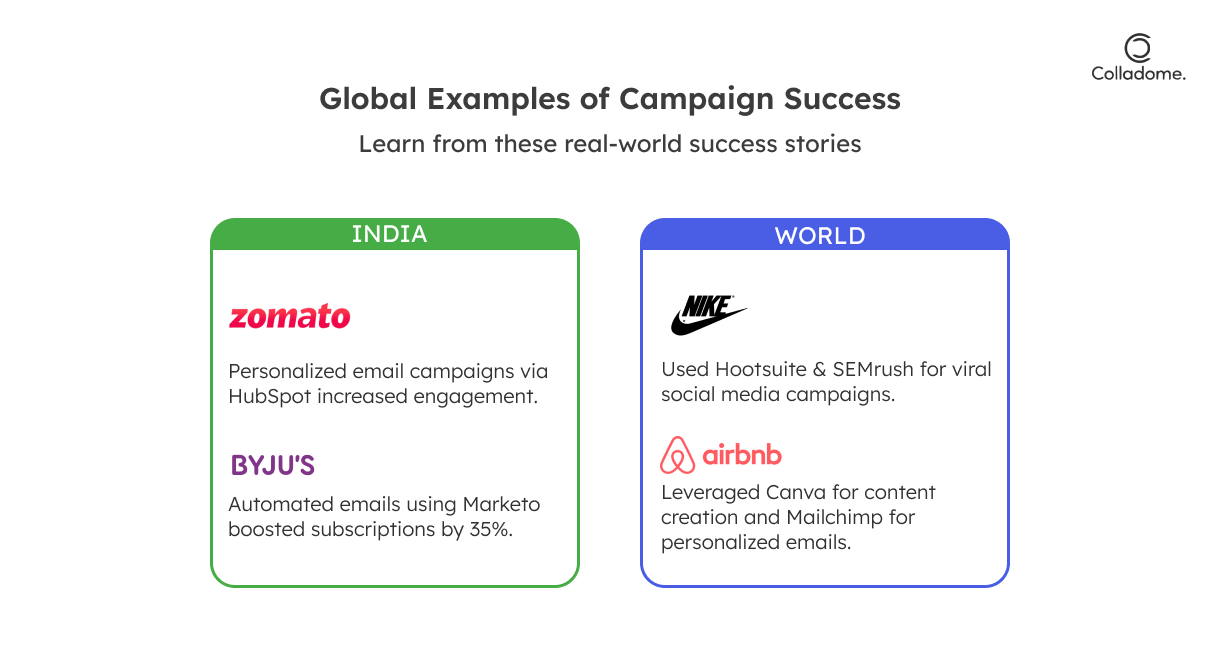
India:
-
Zomato – Winning with HubSpot CRM
- What happened: Zomato ramped up its festive season game by using HubSpot’s CRM to send out personalized emails.
- Result: Engagement soared as customers felt personally connected, boosting conversions during high-traffic periods.
- Why it’s awesome: Zomato didn’t just blast emails; they tailored messages that resonated, resulting in stronger customer loyalty and better click-through rates. That’s the power of marketing automation!
-
Byju’s – Smart Use of Marketo for Email Campaigns
- What happened: Byju’s tapped into Marketo’s marketing automation to track user behavior and fine-tune their email campaigns.
- Result: This strategic targeting led to a massive 35% boost in subscription rates.
- Why it’s awesome: Byju’s proved that data-driven marketing can lead to massive growth, all while keeping things personalized. Smart marketers, right?
Worldwide:
-
Nike – Mastering Social Media with Hootsuite & SEO with SEMrush
- What happened: Nike’s marketing team integrated Hootsuite to manage social media and SEMrush for SEO insights, gaining real-time analytics.
- Result: This one-two punch helped Nike track trending hashtags, optimize content, and boom — they launched a viral campaign that got global attention.
- Why it’s awesome: Nike showed that using the right campaign management tools can help you stay on top of trends, refine strategies, and nail it every time.
-
Airbnb – Seamless Content Creation with Canva & Personalized Emails with Mailchimp
- What happened: Airbnb made content creation simple with Canva for eye-catching visuals and Mailchimp for sending personalized email campaigns.
- Result: Customer retention rates skyrocketed, thanks to timely, personalized emails with beautiful, share-worthy content.
- Why it’s awesome: Airbnb nailed brand consistency while boosting customer loyalty. Great design + tailored communication = marketing magic.
Key Takeaways for Your Campaigns:
- Use CRM and marketing automation to personalize campaigns and build stronger customer relationships.
- Leverage social media management and SEO tools to track trends, measure results, and stay ahead of the competition.
- Seamlessly integrate content creation tools and email marketing to create engaging, memorable experiences that convert.
Statistics That Speak Volumes
- Companies using marketing automation see a 77% increase in lead conversions. (source)
- Email marketing tools generate $36 for every $1 spent. (source)
- Social media tools improve team efficiency by 30% . (source)
- 72% of marketers say tools like SEMrush boost their content performance. (source)
- Businesses using CRMs experience a 41% increase in sales productivity. (source)
Conclusion
Let’s face it: marketing campaigns are no longer about posting a couple of social media updates or sending out a weekly email blast. In today’s world, where marketing tools are evolving at lightning speed, your campaigns need to be smart, automated, and data-driven. The competition is fierce, but the right tools can give you that cutting-edge advantage to stand out and deliver measurable results.
Think of marketing automation tools like your trusty sidekick—helping you manage everything from customer relationships to email campaigns with pinpoint accuracy. Whether you’re a lean startup or an established enterprise, implementing top marketing software like HubSpot, Hootsuite, or Marketo can streamline your campaigns and turn them into powerful engines driving growth.

But here’s the kicker: the future of campaign management isn’t just about using the latest tools—it’s about integrating them into a seamless system that speaks to your audience, captures their attention, and builds a lasting relationship.
At Colladome, we get it. As a leading platform for businesses looking to scale and manage their digital presence, we understand the importance of using the best marketing management tools to optimize your campaigns. Colladome focuses on helping businesses unlock their full potential by integrating the latest marketing strategies with powerful tools, so you can automate and enhance your marketing efforts efficiently. Ready to unlock next-level results with your campaigns? We’re here to help you get there.
Call to Action
So, are you ready to transform your marketing game? Don’t wait for your competitors to pull ahead—take the reins and dive into the world of marketing automation tools today. Start with a free trial of powerful platforms like HubSpot, Hootsuite, or SEMrush, and get firsthand experience of how these tools can supercharge your campaigns.
But remember, tools are only as good as the strategy you put behind them. Whether you’re looking to boost your campaigns in 2025, optimize your campaign performance, or scale your business with top-rated tools, the time to act is now.
Want to really level up? Check out Colladome and discover how we can help you make the most of your marketing management efforts. From strategy to implementation, we’re your partner in campaign success.
Don’t just market—dominate!






